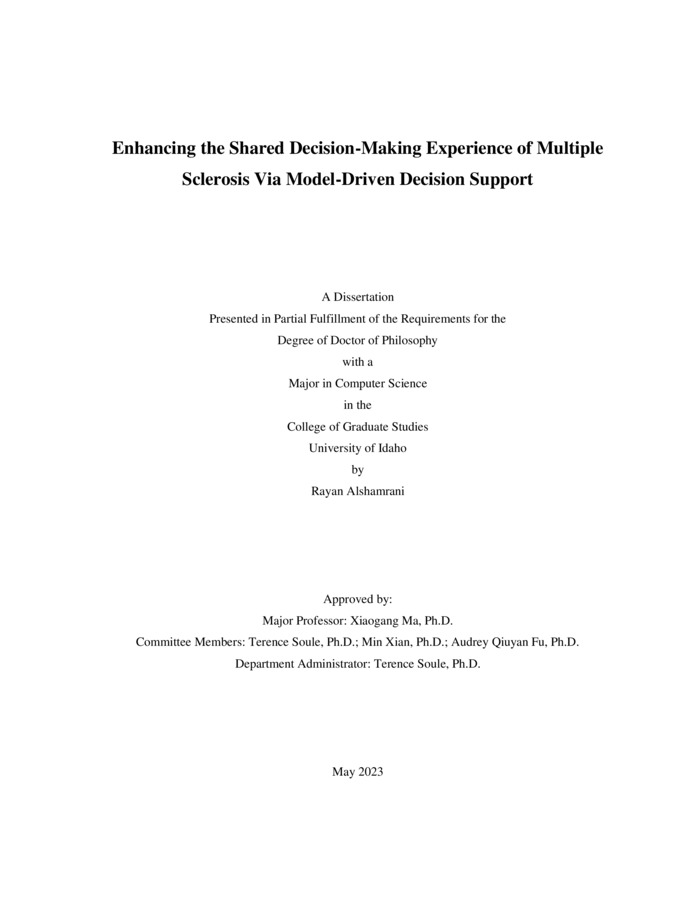Enhancing the Shared Decision-Making Experience of Multiple Sclerosis Via Model-Driven Decision Support
Alshamrani, Rayan. (2023-05). Enhancing the Shared Decision-Making Experience of Multiple Sclerosis Via Model-Driven Decision Support. Theses and Dissertations Collection, University of Idaho Library Digital Collections. https://www.lib.uidaho.edu/digital/etd/items/alshamrani_idaho_0089e_12559.html
- Title:
- Enhancing the Shared Decision-Making Experience of Multiple Sclerosis Via Model-Driven Decision Support
- Author:
- Alshamrani, Rayan
- ORCID:
- 0000-0003-3123-7214
- Date:
- 2023-05
- Keywords:
- Decision support system Knowledge graph Machine learning Multiple sclerosis Ontology engineering
- Program:
- Computer Science
- Subject Category:
- Computer science
- Abstract:
-
Multiple sclerosis (MS) is a disorder that strikes the central nervous system of the human body. Due to the complexity of this disorder, healthcare sectors increasingly need shared clinical decision-making tools that provide practitioners with insightful knowledge and information about MS. These tools ought to be comprehensible by both technical and non-technical healthcare audiences. Decision support systems (DSSs) enhance decision-making by resolving real-world problems through timely practical decisions. DSSs are promising in medicine. That is why several studies reveal the increasing importance of DSSs in most medical domains. DSSs are hypothetically promising tools in the MS domain as they could provide decision-makers with needed information and critical decisions. However, the utilization of DSSs in MS practices remains an open challenge due to the disease's rarity and data scarcity. In general, three issues are needed to be addressed and examined in detail in MS research from the data and computer science perspective: (1) how to predict the type of MS in affected patients? (2) how to determine the most suitable disease-modifying therapy (DMT), specifically the DMT’s administration route, according to an MS patient needs? (3) how to increase the MS's public awareness by presenting a visually reliable source of information? Model-driven DSS is proposed to address these research gaps and enrich the MS field with modern decision-making technology.
The proposed design utilizes machine learning (ML) algorithms to expedite proper solutions for the first two concerns. Therefore, this dissertation investigates several supervised ML models in predicting the type of MS in affected persons and assesses the models’ effectiveness using a real-world MS dataset. A framework for training and comparing the results of various traditional and ensemble algorithms to predict MS episodes is presented. Clinical baseline data from a database of questionnaires was obtained, and then several traditional models and ensemble classifiers were trained against this dataset. To address the first research gap, random forest (RF), decision trees (DT), bagging, and gradient boosting classifiers showed consistently promising accuracy, sensitivity, and specificity results. However, hyperparameter tuning did not yield considerable increases in any evaluation metrics.
With the availability of various DMTs for controlling MS, an accurate selection of the best DMT regimen is critical for improving the quality of life of MS patients. However, selecting the best route of administration suitable for an MS patient depends on the evaluation risks versus the efficacy of a specific DMT. Thus, one of the studies presented in this dissertation demonstrates a framework for a model-based system that utilizes ML algorithms for predicting the best route of administration for delivering DMTs to MS patients. The best-performing models were the gradient boosting and RF. This study serves as a proof-of-concept for the ML application in decision-making regarding MS DMT prescriptions.
Broadly, MS is a preference-sensitive condition. Thus, the shared decision-making regarding the diagnosis and treatment of MS is vital yet complicated. Physicians should have broad domain knowledge about MS, and patients should also know the disorder’s key concepts. A knowledge graph of MS is a viable way to support communication and shared decision-making between physicians and patients. The MS Knowledge Graph (MSKG) using ontology engineering methods and semantic technologies to facilitate and address the third research gap is structured and reviewed in this dissertation. MSKG provides necessary medical terminologies related to MS and organizes them in a logically-coherent framework. Target beneficiaries of MSKG would be patients diagnosed recently or at high risk of developing MS, their first-degree relatives, and anyone interested in obtaining more knowledge about MS.
In short, the dissertation's objective is to design a DSS prototype that emulates an MS expert to accurately identify the type of MS and make appropriate DMT recommendations. The presented DSS uses knowledge representation via ontology engineering and ML to enhance decision-making. Future work should focus on using DSS based on ML and deep learning to understand MS occurrence patterns, etiology, effects on quality of life, and correlations with other disorders. Access to MS data should be readily available, and knowledge graph applications in the MS domain can be improved through knowledge-based reasoning methods. DSS technologies can be pragmatic in the MS domain and research, and further research is necessary to fully realize their potential benefits.
- Description:
- doctoral, Ph.D., Computer Science -- University of Idaho - College of Graduate Studies, 2023-05
- Major Professor:
- Ma, Xiaogang
- Committee:
- Soule, Terence; Xian, Min; Fu, Audrey
- Defense Date:
- 2023-05
- Identifier:
- Alshamrani_idaho_0089E_12559
- Type:
- Text
- Format Original:
- Format:
- application/pdf
- Rights:
- In Copyright - Educational Use Permitted. For more information, please contact University of Idaho Library Special Collections and Archives Department at libspec@uidaho.edu.
- Standardized Rights:
- http://rightsstatements.org/vocab/InC-EDU/1.0/

